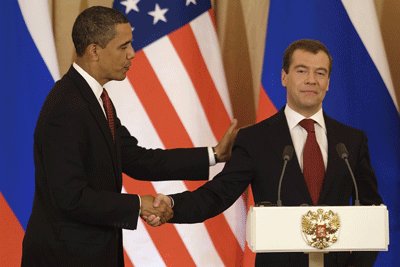« Obama Behaving Like “ugly American” Tourist in Russia ? | Main | In Country With Our Marines 2nd Battalion 8th Marines Echo Co »
July 08, 2009
Desperate Dealings With Moscow With Barack Obama's Giveaway

.

Obama Just Made Us More Vulnerable
Cutting through the White House spin coming out of Moscow, Congressional Strategic Posture Commission member and Missouri State University professor Keith Payne writes in today’s Wall Street Journal:
"Beyond the bad negotiating principle of giving up something for nothing, there will be serious downsides if the U.S. actually reduces its strategic launchers as much as Moscow wishes. The bipartisan Congressional Strategic Posture Commission — headed by former secretaries of defense William J. Perry and James R. Schlesinger — concluded that the U.S. could make reductions “if this were done while also preserving the resilience and survivability of U.S. forces.” Having very low numbers of launchers would make the U.S. more vulnerable to destabilizing first-strike dangers, and would reduce or eliminate the U.S. ability to adapt its nuclear deterrent to an increasingly diverse set of post-Cold War nuclear and biological weapons threats."

Obama went to Moscow desperate for the appearance of a foreign-policy success. He got that illusion -- at a substantial cost to America's security.
The series of signing ceremonies in a grand Kremlin hall and the litany of agreements, accords and frameworks implied that the United States benefited from all the fuss. We didn't.
We got nothing of real importance. But the government of puppet-master Vladimir Putin (nominally just prime minister) got virtually all it wanted. In Moscow, this was Christmas in July.
Ignore the agenda-padding public-health memorandum and the meaningless "framework document on military cooperation" (we've had such agreements before; the Russians always just stiff us). The main course in Moscow was arms control.
President Obama's ideological bias against nuclear weapons dates back to his undergraduate years. Yet those weapons kept the peace between the world's great powers for 64 years. A few remarks about deterrence notwithstanding, Obama just doesn't get it.
He agreed to trim our nuclear-warhead arsenal by one-third and -- even more dangerously -- to cut the systems that deliver the nuclear payloads. In fact, the Russians don't care much about our warhead numbers (which will be chopped to a figure "between 1,500 and 1,675"). What they really wanted -- and got -- was a US cave-in regarding limits on our nuclear-capable bombers, submarines and missiles that could leave us with as few as 500 such systems, if the Russians continue to get their way as the final details are negotiated

Arms Control Amnesia
The new talks with Moscow could put the U.S. nuclear deterrent in jeopardy. Here are the facts
Mr. Payne, a professor of defense and strategic studies at Missouri State University, is a member of the Perry-Schlesinger Commission, which was established by Congress to assess U.S. nuclear weapons capabilities. This op-ed is adapted from testimony given before the House Committee on Foreign Affairs on June 24.
By KEITH B. PAYNE
Three hours after arriving at the Kremlin yesterday, President Barack Obama signed a preliminary agreement on a new nuclear arms-control treaty with Russian President Dmitry Medvedev. The agreement -- a clear road map for a new Strategic Arms Reduction Treaty (START) -- commits the U.S. and Russia to cut their nuclear weapons to the lowest levels since the early years of the Cold War.
Mr. Obama praised the agreement as a step forward, away from the "suspicion and rivalry of the past," while Mr. Medvedev hailed it as a "reasonable compromise." In fact, given the range of force levels it permits, this agreement has the potential to compromise U.S. security -- depending on what happens next.
In the first place, locking in specific reductions for U.S. forces prior to the conclusion of the ongoing Nuclear Posture Review is putting the cart before the horse. The Obama administration's team at the Pentagon is currently examining U.S. strategic force requirements. Before specific limits are set on U.S. forces, it should complete the review. Strategic requirements should drive force numbers; arms-control numbers should not dictate strategy.
Second, the new agreement not only calls for reductions in the number of nuclear warheads (to between 1,500 and 1,675), but for cuts in the number of strategic force launchers. Under the 1991 START I Treaty, each side was limited to 1,600 launchers. Yesterday's agreement calls for each side to be limited to between 500 and 1,100 launchers each.
According to open Russian sources, it was Russia that pushed for the lower limit of 500 launchers in negotiations. In the weeks leading up to this summit, it also has been openly stated that Moscow would like the number of deployed intercontinental ballistic missiles (ICBMs), submarine-launched missiles (SLBMS), and strategic bombers to be reduced "several times" below the current limit of 1,600. Moving toward very low numbers of launchers is a smart position for Russia, but not for the U.S.
Why? Because the number of deployed Russian strategic ICBMs, SLBMs, and bombers will drop dramatically simply as a result of their aging. In other words, a large number of Russian launchers will be removed from service with or without a new arms-control agreement.
The Obama administration will undoubtedly come under heavy pressure to move to the low end of the 500-1,100 limit on launchers in order to match Russian reductions. But it need not and should not do so. Based solely on open Russian sources, by 2017-2018 Russia will likely have fewer than half of the approximately 680 operational launchers it has today. With a gross domestic product less than that of California, Russia is confronting the dilemma of how to maintain parity with the U.S. while retiring its many aged strategic forces.
Mr. Medvedev's solution is to negotiate, inviting the U.S. to make real cuts, while Russia eliminates nothing that it wouldn't retire in any event.
This isn't just my conclusion -- it's the conclusion of many Russian officials and commentators. Russian Gen. Nikolay Solovtsov, commander of the Strategic Missile Troops, was recently quoted by Moscow Interfax-AVN Online as saying that "not a single Russian launcher" with "remaining service life" will be withdrawn under a new agreement. Noted Russian journalist Pavel Felgengauer observed in Novaya Gazeta that Russian leaders "have demanded of the Americans unilateral concessions on all points, offering practically nothing in exchange." Precisely.
Beyond the bad negotiating principle of giving up something for nothing, there will be serious downsides if the U.S. actually reduces its strategic launchers as much as Moscow wishes. The bipartisan Congressional Strategic Posture Commission -- headed by former secretaries of defense William J. Perry and James R. Schlesinger -- concluded that the U.S. could make reductions "if this were done while also preserving the resilience and survivability of U.S. forces." Having very low numbers of launchers would make the U.S. more vulnerable to destabilizing first-strike dangers, and would reduce or eliminate the U.S. ability to adapt its nuclear deterrent to an increasingly diverse set of post-Cold War nuclear and biological weapons threats.
Accepting low launcher numbers would also encourage placing more warheads on the remaining ICBMs -- i.e., "MIRVing," or adding multiple independently targeted warheads on a single missile. This is what the Russians openly say they are planning to do. Yet the U.S. has long sought to move away from MIRVed ICBMs as part of START, because heavy MIRVing can make each ICBM a more tempting target. One measure of U.S. success will be in resisting the Russian claim that severely reducing launcher numbers is somehow necessary and "stabilizing." It would be neither.
Third, the new agreement appears to defer the matter of so-called tactical nuclear weapons. Russia has some 4,000 tactical nuclear weapons and many thousands more in reserve; U.S. officials have said that Russia has an astounding 10 to 1 numerical advantage. These weapons are of greatest concern with regard to the potential for nuclear war, and they should be our focus for arms reduction. The Perry-Schlesinger commission report identified Russian tactical nuclear weapons as an "urgent" problem. Yet at this point, they appear to be off the table.
The administration may hope to negotiate reductions in tactical nuclear weapons later. But Russia has rejected this in the past, and nothing seems to have changed. As Gen. Vladimir Dvorkin of the Russian Academy of Sciences said recently in Moscow Interfax-AVN Online, "A treaty on the limitation and reduction of tactical nuclear weapons looks absolutely unrealistic." If the U.S. hopes to address this real problem, it must maintain negotiating leverage in the form of strategic launchers and weapons.
Fourth, Mr. Medvedev was quoted recently in RIA Novosti as saying that strategic reductions are possible only if the U.S. alleviates Russian concerns about "U.S. plans to create a global missile defense." There will surely be domestic and international pressure on the U.S. to limit missile defense to facilitate Russian reductions under the new treaty. But the U.S. need for missile defense has little to do with Russia. And the value of missile defense could not be clearer given recent North Korean belligerence. The Russians are demanding this linkage, at least in part to kill our missile defense site in Europe intended to defend against Iranian missiles. Another measure of U.S. success will be to avoid such linkages.
In short, Russian leaders hope to control or eliminate many elements of U.S. military power in exchange for strategic force reductions they will have to make anyway. U.S. leaders should not agree to pay Russia many times over for essentially an empty box.
Finally, Russian violations of its existing arms-control commitments must be addressed along with any new commitments. According to an August 2005 State Department report, Russia has violated START verification and other arms-control commitments in multiple ways. One significant violation has even been discussed openly in Russian publications -- the testing of the SS-27 ICBM with MIRVs in direct violation of START I.
President Obama should recall Winston Churchill's warning: "Be careful above all things not to let go of the atomic weapon until you are sure and more than sure that other means of preserving peace are in your hands." There is no need for the U.S. to accept Russian demands for missile-defense linkage, or deep reductions in the number of our ICBMs, SLBMs and bombers, to realize much lower numbers of Russian strategic systems. There is also no basis for expecting Russian goodwill if we do so.

Wild Thing's comment......
In Moscow, this was Christmas in July.Only Obama the idiot at work again. He makes me so angry!!!
 ....Thank you Mark for sending this to me.
....Thank you Mark for sending this to me.
Mark
3rd Mar.Div. 1st Battalion 9th Marine Regiment
1/9 Marines aka The Walking Dead
VN 66-67
Posted by Wild Thing at July 8, 2009 05:47 PM
Comments
Obama can't recall his daughter's age how does the WSJ expect him to remember a quote by Churchill, someone who actually made sense.
Posted by: Mark at July 8, 2009 07:38 PM
obama is Jimmy Carter II. But obama has already done more damage to America in less than 6 months than Carter did in 4 years.
Posted by: TomR at July 8, 2009 08:02 PM
I think Zero smokes his crack pipe everyday and has delusions of grandeur. I pray that God has mercy on my country. Thanks for listening!
Posted by: CB at July 8, 2009 10:06 PM
That's funny--Muddy looks like, "EWWW--I have to shake hands with a black man." He couldn't even look at him. Muddy is giving him the cold shoulder, just like Sarkozy did in France. It should tell Obamanation something--you aren't welcome here.
Posted by: Lynn at July 9, 2009 08:14 AM
Out near Conrad, Montana is the remains of a "Safeguard" site from the early 70s. It was the beginning of a missile defense system. If memory serves me, the basic structures of bararacks and buildings were all the further it got. It was shut down as a result of START. We are going back to 1973 when I was with my dad in a Cessna Skyhawk over Conrad going to Great Falls.
Posted by: Glenn Cassel AMH1(AW) USN RET at July 9, 2009 09:38 AM
